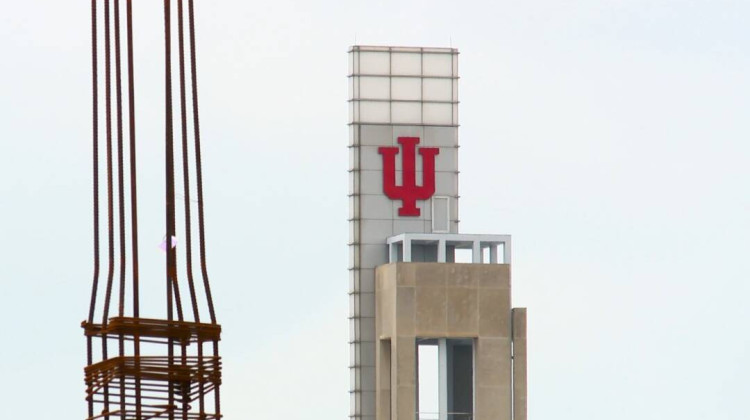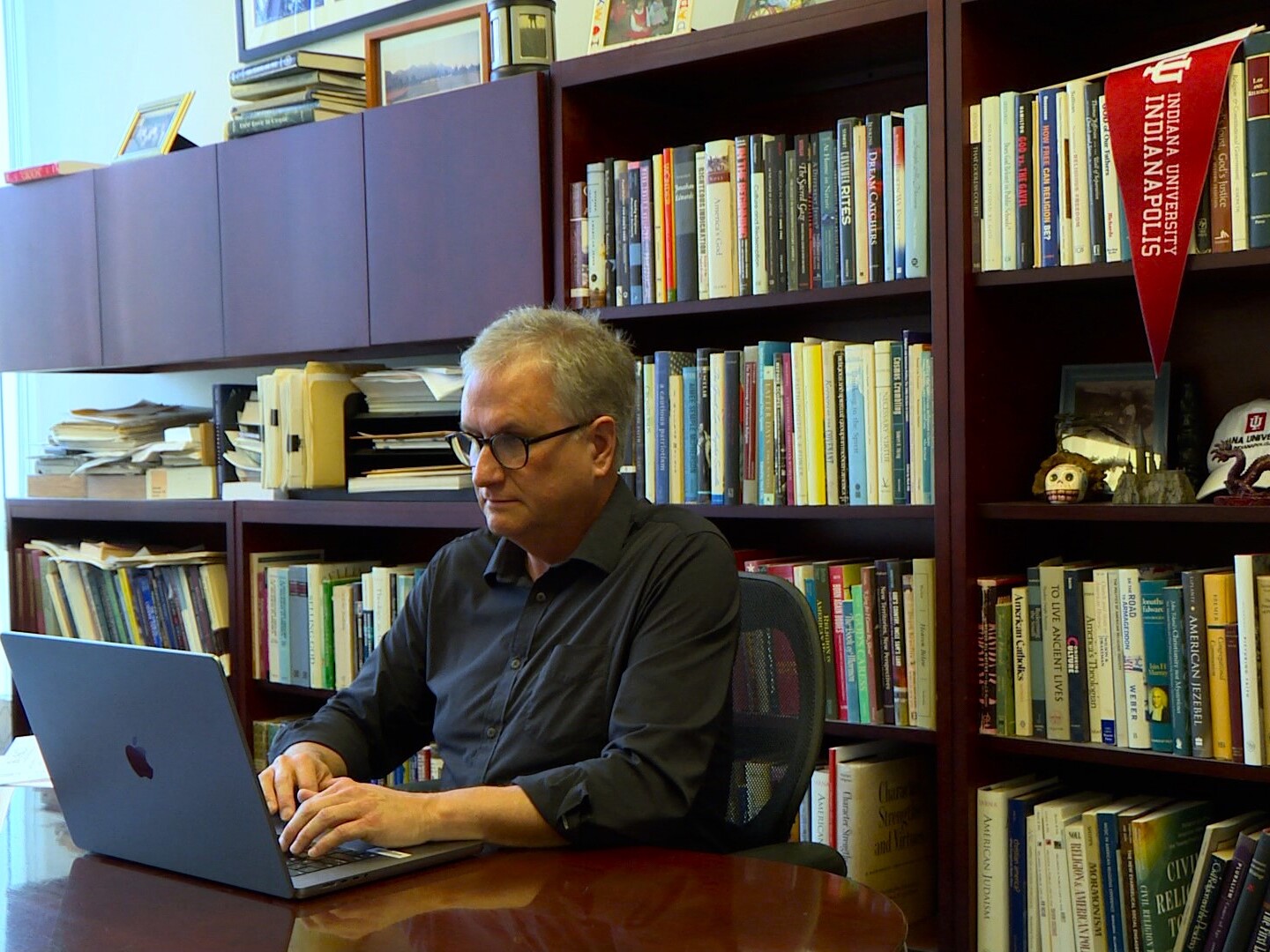
Indiana University Indianapolis construction projects include a new STEM Building for interdisciplinary research.
Devan Ridgway / WFIU/WTIU NewsThe Indiana University Indianapolis campus is quieter in July. But between orientation and summer classes, projects sprout up.
With more than 650,000 square feet of construction finishing in about 15 months, IU Indianapolis is trying to honor its roots while branching out. It officially launched July 1, 2024. IU leaders said the urban research campus builds on the legacy of IUPUI, a 55-year collaboration with Purdue University.
"We are different," said Philip Goff, Indianapolis Faculty Council president. "We've been realigned in ways that really did change the campus."
IU President Pamela Whitten and former Purdue President Mitch Daniels announced the separation of IUPUI in 2022. Whitten welcomed the change, and IU kept most of IUPUI's campus in the deal.
"The Indianapolis campus has nearly limitless potential to make an even greater impact in the region and in the state of Indiana in the years ahead," she said in the announcement.
Proponents pitched the split as a way to graduate more students and prepare a modern economy. Those are values Chancellor Latha Ramchand is upholding.
"Once the students are here, we don't just admit them, right? Literally, we adopt them," Ramchand said. "We want to make sure they succeed, which means that I want to see every one of those students graduate, graduate on time and graduate with a job offer in hand."
The campus has pivoted hard toward career preparation that aligns with growing fields in Indiana. Ramchand said 75 percent of students work during college, but sometimes they're not working in jobs that align with their studies.
"How do we connect them to internships, to co-op opportunities, so that by the time they're in their senior year, they have a job offer in hand?" Ramchand said.
Goff said IUPUI had its beginnings in professional training, so it's natural for IU Indianapolis to build on that.
"We try, at the same time, to be a full-service university, offering everything a person needs to have a full education, and not just job training," Goff said.
IU Indianapolis recently reached research 1 status, a recognition of its level of high research spending and activity.
"That didn't happen just last year," Ramchand said. "It was a validation of the work that has happened on this campus, and to me, what stands out loud and clear is that the people here make such a difference to this campus and to this community."
Capitalizing on a push to grow the biological tech industry in the city, IU Indianapolis will build more laboratories and grow STEM research.
Along with significant investments from the university, these initiatives have been funded by local partners. Lilly Endowment CEO Clay Robbins celebrated a $138 million investment this year into IU LAB, or the Launch Accelerator for Biosciences. It will mix education, career preparation, research and commercialization in the 16 Tech Innovation District in Indianapolis.
"The initiative shows great promise to enhance and expand our state's intellectual capital in one of Indiana's most important industry sectors," said Robbins.
Along with local business partners, local schools are playing a huge role. Eighty-four percent of IU Indianapolis students come from the state, and most will live and work in Indiana after they graduate.
Goff said IUPUI faculty and staff built up connections with local schools for years.
"We are thinking about what we want to keep from what we were, very socially engaged, very engaged in the community and in the classrooms," Goff said.
The campus launched a new seamless admission program, so qualifying high school seniors are automatically admitted. Students will only need to fill out a form stating they want to enroll. All Indianapolis Public Schools are part of the program, and it's expanding to other school districts.
Ramchand said Indiana's leaders want to get more kids in college. The college-going rate hasn't grown in recent years, with about 53 percent of high school seniors choosing to go into higher education .
"Our focus has been, why is it that 47 percent of them choose not to come here?" Ramchand said. "Let's go out into the community. Let's go to the high schools. Let's talk to the principals. Let's talk to high school counselors and understand, what is it that prevents students from wanting to come to college?"
In addition to Indiana's workforce and education needs, IU Indianapolis is responding to state laws.
For example, this year, legislators required public colleges to remove degree programs with a low number of graduates. IU Indianapolis will eliminate, merge or suspend about 45 programs, including a B.S. in biotechnology and some foreign language degrees.

Public colleges volunteered the programs to comply with the law, which went into effect July 1.
Though it's had pushback from some at IU, Ramchand believes the changes could help the university meet all learners where they are.
"We don't change what we teach," Ramchand said. "The laws of physics have not changed, but we are making changes to the way in which we deliver education."
The loss of federal funding for research and new mandates are issues. Goff said the removal of diversity, equity and inclusion programs could be a problem in Indianapolis.
"That hurts urban universities more than it does others," Goff said. "Don't get me wrong, they're all harmed by this, but urban campuses are especially harmed by it."
Still, Goff said IU Indianapolis has a lot going for it. It's a research 1 like IU Bloomington, but embedded into the community like a regional campus. He's been a professor for 33 years, and Goff said he's more excited now than he's ever been.
"We're this hybrid university that can do things and try things that other campuses can't," Goff said. "That's what makes it exciting."
Aubrey is our higher education reporter and a Report For America corps member. Contact her at aubmwrig@iu.edu or follow her on X @aubreymwright.
 DONATE
DONATE






 Support WFYI. We can't do it without you.
Support WFYI. We can't do it without you.